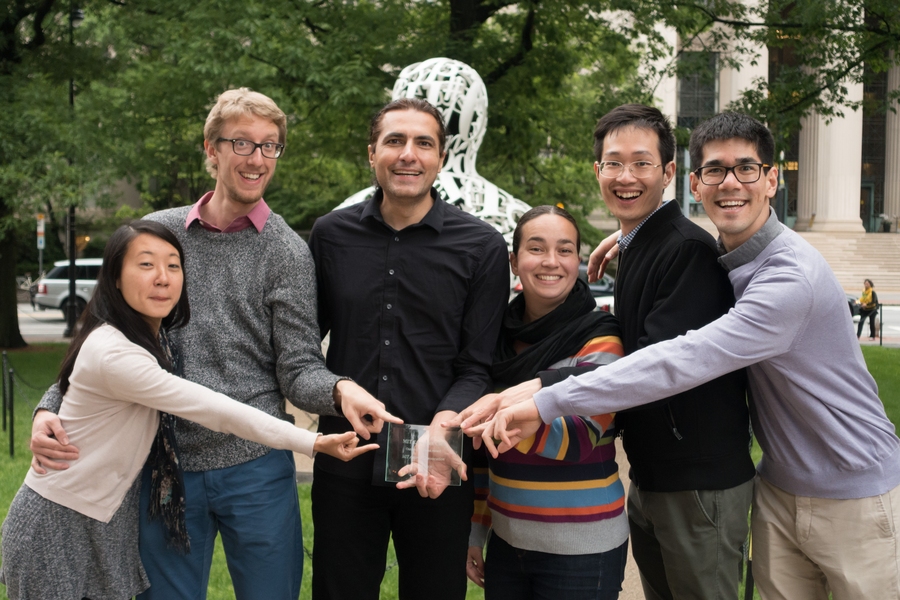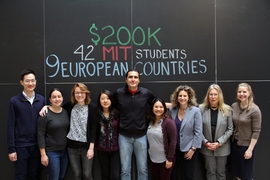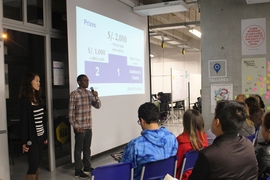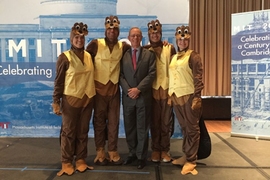The MIT European Club has donated $40,000 to fund 10 new MISTI European Fellows this summer. Not only is it of the most substantial gifts given by a student group to the MIT community, it also marks the 10th anniversary of a successful partnership.
“The students of the MIT European Club have shown outstanding leadership by enabling their fellow MIT students to benefit from MISTI internships in Europe,” says Richard K. Lester, the Japan Steel Industry Professor of Nuclear Science and Engineering and associate provost for international activities. “This is a wonderful example of MIT students looking out for each other.”
Alicia Goldstein Raun, managing director of MISTI’s MIT-Spain, MIT-Portugal, and MIT-UK programs, says she finds pride in the strong partnership that the MIT European Club and MISTI European country programs have built. “As a result, more MIT students will have the opportunity to practice the 'mens-et-manus' approach in the European context and contribute towards solving the world’s greatest challenges,” she says, referring to the Institute's motto of "mind and hand."
As strong supporters of MISTI programs in Europe, the club has allocated the gift to fund ten MISTI fellows this summer in Belgium, France, Germany, Italy, the Netherlands, Spain, Switzerland, and the United Kingdom. The student projects include:
- promoting innovation and action plans in the public sphere through a multidisciplinary endeavor within the Innovation in Policy Leaders Program in France;
- identifying genes and markers for drug response in the neuroblastoma cell line using CRISPR sgRNA libraries in Germany;
- interning at TU Delft Center for Systems and Control within the Department of Mechanical, Maritime and Materials Engineering in the Netherlands;
- modeling the mouse brain and learning processes under the Neuromorphic Cognitive Robotics group at the Institute for Neuroinformatics in Switzerland;
- researching topology and geometry of algebraic varieties, singularities, and D-modules at KU Leuven in Belgium;
- using confidential Italian social security data to study the impact of governmental subsidies on company hiring through the National Institute for Social Protection in Italy;
- developing disaster risk management procedures on the Peace and Stability team within the Space, Security, and Migration Directorate of the European Union Joint Research Center in Italy;
- working at McLaren Automotive on the suspension, engine testing and rear frame teams in the United Kingdom; and
- generating joint forces and applying a deep learning model to the human body to prevent injuries and optimize treatments for patients recovering from surgery in Spain with the Universitat Politècnica de Catalunya.
Giulio Alighieri, the president of the MIT European Club, says MISTI fellowships “allow MIT students to do research while experiencing firsthand European culture. Because of that, the partnership with MISTI is the cornerstone of the plan to fulfill our mission to connect MIT students with Europe.”
The funds for the MISTI-European Club fellowships were raised in part through the yearly European Career Fair (ECF), which Alighieri, a PhD candidate in cancer research at the MIT Department of Chemical Engineering, calls a “tremendous and unique opportunity.” Alighieri praises the MISTI officers and network that helps the club recruit more companies for the ECF, and the dedication of the members of the MIT European Club who organize it.
Each year, MISTI matches over 1,000 students with internship, research, and teaching opportunities at leading companies, research institutes, and universities around the world. Based in the Center for International Studies within the School of Humanities, Arts, and Social Sciences (SHASS), MISTI is MIT’s pioneering international education initiative and collaborates with departments, programs and clubs across the Institute.
The MIT European Club is a student activity club of over 2,700 postdocs, graduate students, undergraduates, and visiting scientists. The club’s current executive board members are president Giulio Alighieri, vice president Susanna Bächle, treasurer Karine Ip Kiun Chong, secretary Katrin Michel, social chair Xiaoyu Wu, and events chairs Saviz Mowlavi and Jane Hung.
Lea Morical, a freshman in mechanical engineering who is currently interning in Spain, says the European Career Fair and MISTI help effectively realize the MIT European Club's mission of fostering cross-cultural collaborations.
“The programs enable MIT students of all levels to work and live in Europe,” Morical says.
Leah Flynn Gallant, associate dean and director for student leadership and engagement programs at MIT, speaks highly of the club’s current board and president.
“Giulio Alighieri has worked tirelessly with his board to think of new and innovative ways to recruit students and connect with European student community networks in and outside of MIT to continue the success of the European Career Fair,” Gallant says. “It has been a pleasure to work with and see the European Club grow over the past few years.”










